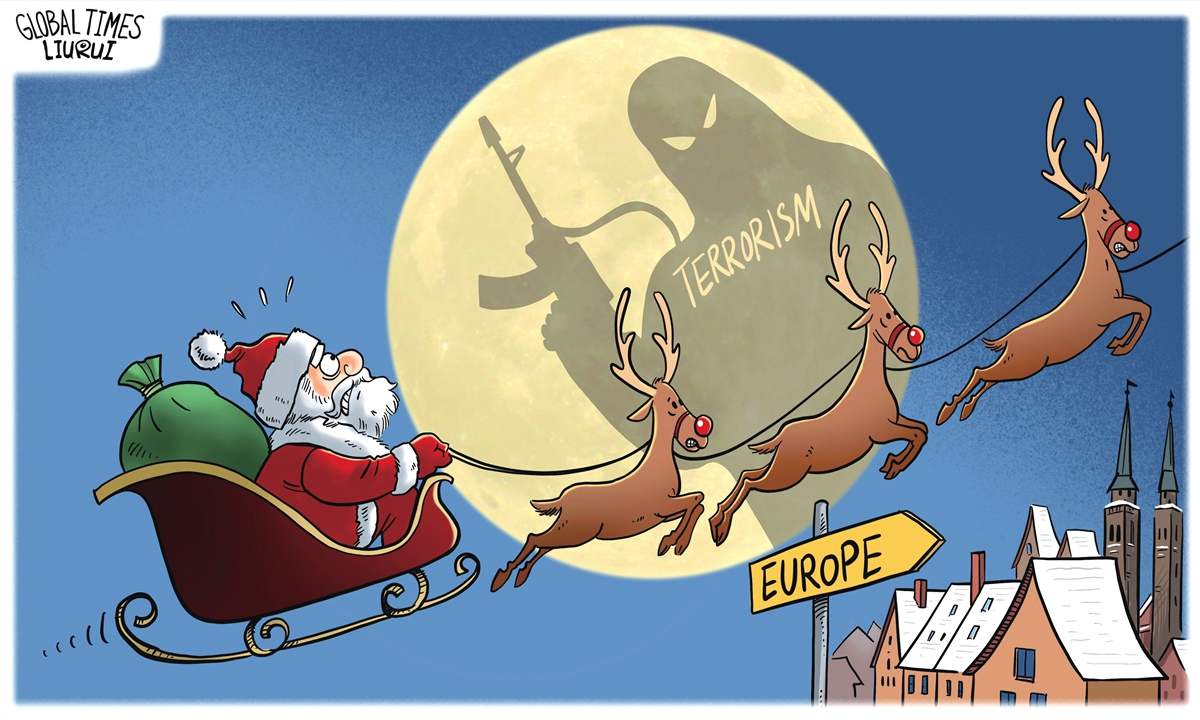December 25 is Christmas Day in the West, which is supposed to be the most important and lively festival of the year. But if you look at the headlines of the US and Western media on Monday, people feel that “Christmas Eve is not safe,” and the due festiveness and peace of the holiday were pushed to the edge of various conflicts and chaos. The ongoing war in Gaza, the shooting at a Colorado mall in the US, the alerts against terrorism in Europe, the flooding in Australia, etc. Pope Francis said on Christmas Eve that “the Prince of Peace is once more rejected by the futile logic of war, by the clash of arms.” This allegorical exclamation was widely spread and touched the heart of the Western world.
Christmas Eve and Christmas is a time of reunion, tranquility and good tidings in Western culture. For the Western world, this year’s Christmas Eve was indeed full of trouble: the tumultuous atmosphere brought about by the Russia-Ukraine conflict, the Israeli-Palestinian conflict, and domestic political and social divisions, “dulls and threatens to suffocate the joy of Christmas.” It would not be an exaggeration to say that this was the most depressing Christmas Eve in the West since the end of the Cold War.
However, it is regrettable that although Western public opinion lamented the world’s insecurity, they could hardly dive into any deep reflection on the reasons why Christmas Eve is no longer peaceful. Instead, they fell into a kind of meaningless wail and complaint. If the lamentations of the West do not touch the soul and are still revolving around “Western-centrism,” then they will not have any positive effect on the fight for global security.
Can’t the West perceive the root of its insecurity? It lies within the West itself. In recent years, Western countries have not ceased discussing security; many political leaders and public opinions habitually talk about “derisking.” In pursuit of absolute security, the US-led West invested a considerable amount of manpower, resources, and finances. The proportion of military spending to GDP is generally on the rise. Not only has NATO, a relic of the Cold War, refused to fade away, but the West has also initiated numerous groups worldwide in the name of “security.” However, despite such significant investments and efforts, the security situation in the West has deteriorated. It has fallen into the paradox where the more they pursue “security,” the more insecure they become. The fundamental reason is that the West’s approach deviated from the right path from the very beginning.
The security pursued by the US and the West is a narrow form of security rooted in conflict and confrontation. When Western countries, particularly the US, speak of “our security,” the term “our” does not encompass all of humanity but is limited to the US-led West. Similarly, when discussing “maintaining global security,” it does not genuinely aim to safeguard the security of the entire world but rather to talk about upholding the hegemony of the US and the West.
This form of fragmented security, created through military aggression, forming alliances, inciting conflicts, and shifting blame, undermines the common security of the entire world. The narrow and one-sided pursuit of so-called group security by the US and the West, inevitably results in insecurity for other nations. The deterioration of the security situation in other countries, in turn, places the Western world in an even more precarious position. This artificially created security opposition only leads all involved parties into a security trap, making everyone increasingly feel insecure.
Some public opinions insightfully pointed out that the West, driven by its desire to maintain hegemony, is more inclined to focus on “crises of others.” However, the Western world does not exist in a vacuum – the entire world shares a common destiny. Constantly manufacturing “crises of others” also easily sparks one’s own crises. The West cannot remain exempt on its own. A German auxiliary bishop from Cologne, interviewed by the Associated Press, mentioned that the Cologne Cathedral, which received special attention from police and police dogs on Christmas Eve this year, was “probably the most secure church service in all of Germany.” This could be taken as a form of self-deprecation, mirroring real security challenges faced in the West.
Whether in the West or the East, among developed nations or developing countries, the aspirations of ordinary people boil down to the same thing – a peaceful and prosperous life. No one wishes for warfare to occur in their own country, and nobody wants to witness the emergence of economic or social crises. In this regard, there is a universal sentiment worldwide. The difference lies in the type of “security” we seek – whether it is a universally shared security or a comparative security where “you must be worse off than me.” The diverse starting points often lead to vastly different outcomes.
A secure world is a common aspiration of all humanity. Security is not something that falls from the sky. China proposed the Global Security Initiative this year, urging the world to follow a path of pursuing common security. This proposal has rapidly gained enthusiastic responses from the international community, reflecting its timeliness and urgency. On this Christmas Eve that is not so silent, we hope it can lead to more reflection in the West and prompt greater participation from various sides, including Western and US societies, in building a path toward common security. In doing so, the world may expect a more hopeful Christmas Eve next year.












